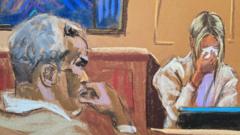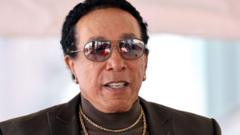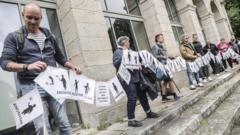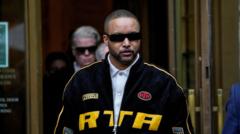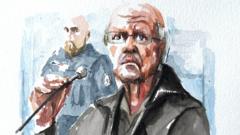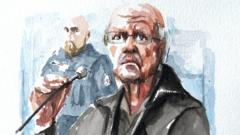As the trial of Joel Le Scouarnec nears its conclusion, frustration mounts among victims over the nation’s indifference to the widespread child abuse case that highlights systemic failures.
**Unpacking the Silence: France Confronts Disturbing Child Abuse Case**
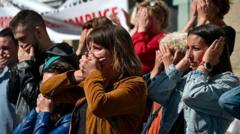
**Unpacking the Silence: France Confronts Disturbing Child Abuse Case**
Victims of France's most prolific paedophile demand recognition and accountability in landmark trial.
In the picturesque coastal town of Vannes, Brittany, a trial has unfolded that many believed would trigger a societal reckoning in France, much like last year's Pelicot case, which captivated audiences around the globe. As it draws to a close this week, however, the trial of retired surgeon Joel Le Scouarnec—convicted of abusing 299 victims, predominantly children—has seen a disturbing lack of public engagement and attention.
"Exhausted and angry" at the societal indifference to the severity of the abuse, one of Le Scouarnec’s victims, 36-year-old Manon Lemoine, has joined forces with over 50 other victims to form a campaign aimed at pressuring the French authorities for recognition and reform. They accuse the government of neglecting this significant case that reveals a shocking "laboratory of institutional failures." Despite calling attention to their plight, they feel increasingly marginalized, citing a lack of action similar to that provided in other high-profile abuse cases.
In a courageous move, some victims who had initially chosen to testify anonymously are now revealing their identities. They hope to jolt the public into acknowledging the abhorrent acts that occurred under the protection of a trusted medical professional, with crimes dating back to 1998. “It’s not normal that I should have to show my face… we decided to rise up to make our voices heard,” said Lemoine.
Observers have noted that the prominence of a single, identifiable victim—such as Gisèle Pelicot in the previous trial—has been missing in this case, which may have contributed to the lack of public mobilization. The trial’s grim subject matter and the sheer number of victims involved may have created an uncomfortable barrier for engagement.
Lawyers representing victims, including Myriam Guedj-Benayoun, have voiced strong criticism against what they see as a "systemic, organized silence" around child sexual abuse in France. This case not only exposes the heinous acts committed by Le Scouarnec but has also prompted discussions about a culture that often shelters those in power from scrutiny, particularly in the fields of medicine and law.
The courtroom has been a harrowing space, revealing the minute details of Le Scouarnec’s depravity, where he meticulously documented his crimes. He exploited the vulnerability of young patients under anaesthesia or post-surgery care, showcasing a level of predation that has left many in shock. The testimony has raised significant questions about the systemic failures that allowed his acts to go unchecked for so long.
As the trial progresses, a sense of urgency mounts among advocates who stress the need to confront the realities of child sexual abuse openly. They warn that the absence of dialogue not only perpetuates trauma for victims but also enables a culture of silence that echoes throughout society.
Following the proceedings, a growing number of journalists and observers have begun to engage more openly with the trial, yet there remains an undertone of anxiety. Will this case lead to meaningful conversations and changes in societal attitudes towards child protection?
As the narrative unfolds, Manon Lemoine and her fellow victims remain determined to ensure that their experiences catalyze change. “This trial is like a clinical laboratory,” stated Guedj-Benayoun, emphasizing the potential for the case to reshape understanding of trauma and its lasting impact.
Despite Le Scouarnec's inevitable conviction, the question remains: will this moment mark a turning point for France in how it handles child sexual violence, or will the cycle of silence continue? Activists and victims alike are left to navigate this uncertain landscape, determined to make their voices heard.






